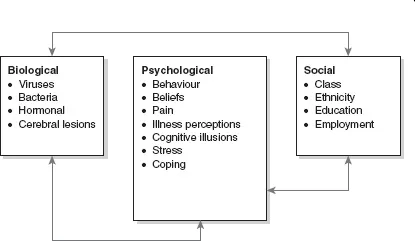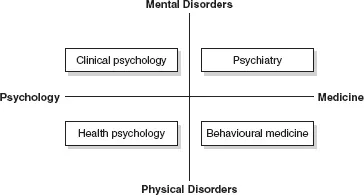
This is a test
- 304 pages
- English
- ePUB (mobile friendly)
- Available on iOS & Android
eBook - ePub
Key Concepts in Health Psychology
Book details
Book preview
Table of contents
Citations
About This Book
While current textbooks in health psychology offer the reader some conceptual reasoning about different aspects of the discipline, there is no one source which provides an accessible, navigable and cross-referenced analysis of the major models and ideas in health psychology.
Key Concepts in Health Psychology provides a `one stop? analysis of key issues, theories, models and methods in contemporary health psychology. It enables the reader to engage with a full range of approaches and methods in the field, and importantly to be able to appreciate the relationships between these.
Frequently asked questions
At the moment all of our mobile-responsive ePub books are available to download via the app. Most of our PDFs are also available to download and we're working on making the final remaining ones downloadable now. Learn more here.
Both plans give you full access to the library and all of Perlego’s features. The only differences are the price and subscription period: With the annual plan you’ll save around 30% compared to 12 months on the monthly plan.
We are an online textbook subscription service, where you can get access to an entire online library for less than the price of a single book per month. With over 1 million books across 1000+ topics, we’ve got you covered! Learn more here.
Look out for the read-aloud symbol on your next book to see if you can listen to it. The read-aloud tool reads text aloud for you, highlighting the text as it is being read. You can pause it, speed it up and slow it down. Learn more here.
Yes, you can access Key Concepts in Health Psychology by Ian Albery,Marcus Munafo in PDF and/or ePUB format, as well as other popular books in Psychology & History & Theory in Psychology. We have over one million books available in our catalogue for you to explore.
Information
DEFINING HEALTH PSYCHOLOGY | 1 |
ONE |
DEFINING HEALTH PSYCHOLOGY
and: bio-medical model
psychosomatic medicine
biopsychosocial model
health psychology
social inequalities in health
epidemiology of health and illness
psychosomatic medicine
biopsychosocial model
health psychology
social inequalities in health
epidemiology of health and illness
What is this discipline we call ‘health psychology’? Where did it originate and what was its developmental sequence? How is health psychology distinct from other areas that psychologists have submerged themselves in? This initial chapter focuses on these questions and details historically the approaches to health and illness which have contributed to the development of health psychology as a sub-discipline of psychology in general. In addition, we outline how health psychology is conceptualized and what the parameters of the discipline are, as well as the aims and objectives that underpin the area of study. Having examined approaches to health and illness and provided a definition of the area, a number of concepts are presented that detail terms that are of direct contextual relevance for the study of psychological processes in the aetiology and treatment of illness and the prevention of negative health outcomes. The first revolves around the question of what is the relationship between various social inputs on the one hand and the experience of negative health outcomes on the other? More importantly, what is the role of psychological factors in describing this relationship? The second draws on the concept of epidemiology in ascertaining the magnitude and nature of health and illness, and the role psychology plays in establishing reasons for figures related to numbers of people experiencing adverse health and/or undertaking maladaptive health behaviours.
DEFINING HEALTH PSYCHOLOGY
and: BIO-MEDICAL MODEL
and: PSYCHOSOMATIC MEDICINE
and: BIOPSYCHOSOCIAL MODEL
MEANING
The development of ideas about the origins and meaning of the terms ‘health’ and ‘illness’ has resulted in the emergence of a number of approaches designed to encapsulate the primary details of the concept and also provide parameters to its study. These approaches in many ways provide the conceptual pathway that has resulted in the discipline of health psychology. Think of these models as being formative in the historical development of health psychology as an independent level of enquiry. It is the parameters detailed in models and approaches developed to conceptualize health and illness that need to be considered, if the distinctiveness of a psychological approach to health is to be established.
ORIGINS
The study of health, illness and well being has a long history, dating back to the philosophical debates about the relationship between physical (bodily systems) and psychological systems found in the writings of the Greek philosophers Hippocrates (circa 460–circa 377 BC) and Galen (AD 129–circa 199). In so-called ‘humoral’ theory, these early writers argued that disease or illness arose when the four fluids argued to circulate the physical system (i.e. blood, black bile, yellow bile and phlegm) were out of balance. Importantly, however, these writers also proposed that there was a relationship between a preponderance of one of the bodily fluids and bodily temperaments or personality types. In other words, disease was associated with physical factors but these physical factors also affected the mind. The Middle Ages saw an obsession with demonology and mysticism and reinforced the view that illness was associated only with mental states. With the rise of modern medicine, however, dualism – the argument that the mind and body are independent and not causally related – became the favoured position, and as such physicians treated bodily ailments without the need to recognize the role of the mind in illness aetiology.
CURRENT USAGE
The bio-medical model adheres to this formulation. It considers that the mind cannot influence physical systems and vice versa and as such that the mind and body are completely separate entities. Illness is caused by external agents such as viruses or germs which create physical changes in the bodily system. Psychological processes are completely independent from any illness or disease process. The biomedical model has provided the mainstay of descriptive parameters for the study of health and illness for over 300 years. During the last century, however, a number of perspectives have been developed which challenge the bio-medical perspective. These propose a greater role for psychological and social processes in the aetiology and treatment of illness. Psychosomatic medicine grew as a branch of psychoanalysis and the study of hysteria developed by Freud and Breuer (Sulloway, 1980). It was observed that some people showed all the classic indications of neurological damage, such as paralysis of the legs or arms, when there was no underlying physical cause. Freud called this observation ‘hysterical paralysis’ and argued, on the basis of his famous work studying the patient Anna O, that the ailment was caused by mentalisms i.e. thoughts about experiences and feelings. While the arguments are intriguing, psychosomatic medicine suffers from its inability to provide sound empirical evidence to link causally mind matters and physical health (Holroyd and Coyne, 1987).

Figure 1.1 The biopsychosocial model of health and illness (after Engel, 1980)
Probably the most influential contemporary model of health and illness is the biopsychosocial model which considers that biological, social and psychological factors interact as dynamic processes in determining the onset, progression and recovery from illness (see Engel, 1977, 1980; Anagnostopoulou, 2005; and also Figure 1.1).
As you can see in Figure 1.1, the biopsychosocial model proposes that factors ranging from the changing status of molecular structures (i.e. the biological), the presence of social support (i.e. the social factor) and thoughts and feelings (i.e. the psychological factors) co-vary with each other to produce illness or health. It therefore rejects the dualist philosophy of the bio-medical model. Donovan (1988) has proposed a biopsychosocial model of addiction which focuses on the interaction between the biological (e.g. neuroadaptation after the ingestion of an addictive substance), the social (e.g. submitting to peer pressure to use addictive substances or behaviours, socio-economic class, and so on) and the psychological (e.g. expectancies associated with undertaking a behaviour) to explain the multifaceted experience of ‘addiction’ (see also Marlatt et al., 1988). The biopsychosocial model also implies a more ‘holist’ approach for the study of health and illness, as well as interventions designed to prevent people from becoming unhealthy and making ill people well again. While, as a model, the biopsychosocial is inherently appealing by emphasizing the interplay between various forces and factors in the experience of health and illness, the complexity of these relationships means that the ‘true’ causal structure of the system may not be derived in a complete state (Armstrong, 1987).
SIGNIFICANCE TO HEALTH PSYCHOLOGY
The bio-medical model, psychosomatic medicine and, in particular, the biopsychosocial model provide the history and parameters within which to view the development of the discipline called ‘health psychology’ (see health psychology concept – this chapter). These approaches have argued about the relationship between the mind and body either taking a dualist stance (biomedicine) or monist (biopsychosocial) stance, the later being adopted for the study of psychology and health.
Further reading
Donovan, D.M. (1988) Assessment of addictive behaviors: implications of an emerging biopsychosocial model. In D.M. Donovan and G.A. Marlatt (eds), Assessment of Addictive Behaviors. New York: Guilford Press. pp. 3–48.
This paper provides a useful introduction to the biopsychological model in the area of addictive behaviours.
Engel, G.L. (1980) The clinical application of the biopsychosocial model. American Journal of Psychiatry, 137, 535–544.
This work details how the biopsychosocial model may be applied in interventions in health-related problems.
See also defining health psychology and health psychology
DEFINING HEALTH PSYCHOLOGY
and: HEALTH PSYCHOLOGY
MEANING
Health psychology is the term given for the academic discipline that seeks to understand the role of psychological processes in the experience of health and illness, the causes of health and illness, the progression of health and illness, and the consequences of health and illness. Health psychology is concerned with physical health as opposed to mental health – the latter being the focus of clinical psychology – although the differentiation between physical and mental health may be more arbitrary than real at times (Adler and Matthews, 1994). Kaptein and Weinman (2004) outlined a useful diagram to illustrate where health psychology is placed with near relatives in studying physical and mental disorders from psychological and medical viewpoints. This is reproduced in Figure 1.2.

Figure 1.2 Where health psychology sits in relation to related areas of study
(Source: Kaptein and Weinman, 2004)
(Source: Kaptein and Weinman, 2004)
Health psychology is an umbrella term for the study of those psychological processes that are important for understanding how health can be promoted and maintained, how illnesses can be treated and prevented in the first place, what psychology has to say about the aetiological and diagnostic basis of health and illness, and how an understanding of psychological processes is important for the development of healthcare and health policy systems. Based on Matarazzo’s (1980, 1982) definition (see Box 1.1), Kaptein and Weinman (2004) call these ‘the four core elements of health psychology’ (p. 6).
Box 1.1 A definition of health psychology
Health psychology is the aggregate of the specific educational, scientific, and professional contributions of the discipline of psychology to the promotion and maintenance of health, the prevention and treatment of illness, the identification of aetiologic and diagnostic correlates of health, illness and related dysfunction and to the analysis and improvement of the health-care system and health policy formation. (Matarazzo, 1982: 4)
Matarazzo’s definition of health psychology has been criticized for being over inclusive and allowing ‘health psychology to inhabit all the domains of health-care delivery’ (McDermott, 2002: 41). According to McDermott (2002) this is problematic because major parts of Matarazzo’s conceptualization of health psychology actually refer to contemporary clinical psychology. Whether this assertion is accepted or not, McDermott argues for the reformulation of a definition of health psychology based on behavioural health. In other words, he proposes that health psychology should be about health maintenance and illness prevention in people that are already healthy. This includes a focus on health promotion and understanding processes of decision making in healthy people (including risk perception) rather than concentrating on treatment and recovery factors. In this way health psychology ‘truly becomes a psychology of health, rather than a psychology of illness’ (McDermott, 2002: 46).
ORIGINS
Health psychology as a discipline is in its infancy. Very few textbooks or journals, let alone societies devoted to the study of health psychology, existed prior to the late 1970s to early 1980s. With the arrival of the twenty-first century we have seen health psychology grow significantly. Psychological societies and associations have their own divisions or sections devoted to the discipline, major international journals have been established to report health psychology research (e.g. Health Psychology and Psychology and Health) and there cannot be very many universities around the world that do not offer courses or modules in the area. In the UK, for example, you can even undertake professional training that leads to becoming a Chartered Health Psychologist (see www.bps.org for more information). However young, it is a discipline that is rooted in the historical and theoretical battle to understand the relationship between the mind (or thinking, emotions and so on) and physical change (that might be reflected in physical ill-health). We have already discussed this history in the previous key concept and have showed the development of the meaning of health from the anci...
Table of contents
- Cover Page
- Title Page
- Copyright
- Dedication
- Contents
- List of Figures
- List of Tables
- List of Boxes
- Preface
- Acknowledgements
- Publisher’s Acknowledgements
- 1 Defining Health Psychology
- 2 Research Methods and Measurement
- 3 Social Cognitive Models
- 4 Biological and Physiological Models
- 5 Individual Differences and Habit
- 6 Illness-Related and Sick Role Beliefs
- 7 Acute and Chronic Illness
- 8 Pain
- 9 Addictive Behaviours
- 10 Health Promotion and Intervention
- Glossary
- References
- Index